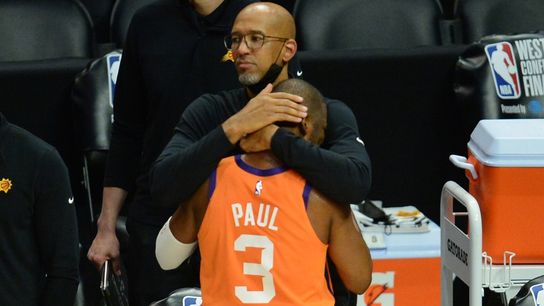The Phoenix Suns won the Western Conference Finals Wednesday night, eliminating the LA Clippers with a 130-103 victory at Staples Center.
To state the obvious, it's a monumental victory. To state the less obvious, it's monumental in more ways than one.
The franchise began play in the 1968-69 season and has only reached the NBA Finals twice. They lost both times, falling to the Boston Celtics in six games in 1976 and to Michael Jordan and the Chicago Bulls, again in six games, in 1993. Considering Phoenix will have a considerable rest advantage over whoever emerges from the East (the East Finals are tied 2-2) and the best players from both teams -- Trae Young for the Atlanta Hawks, Giannis Antetokounmpo for the Milwaukee Bucks -- are both battling injuries, the Suns will enter the Finals as favorites.
The 2021 NBA playoffs have been the most wide-open in decades, and the Suns have a scorching-hot opportunity to win the whole thing.
It's also a monumental victory for this particular band of Phoenix Suns.
Led by 24-year-old Devin Booker and 22-year-old Deandre Ayton, this Suns team has one player with a single minute of Finals action, Jae Crowder. That's not necessarily surprising for a team made up of young players on a team that last made the playoffs in 2010, but it's a long time coming for a couple of Suns.
It's a long time coming for Chris Paul, the fourth pick in the 2005 draft with more than 42,000 career minutes.
And it's a long time coming for head coach Monty Williams.
He was drafted in 1994 by a New York Knicks team fresh off taking the Houston Rockets to seven games in the NBA Finals, Williams spent a decade in the league and never reached the Finals. He joined an NBA bench in 2005 and never reached the Finals.
While working as an Oklahoma City Thunder assistant in 2016, Williams lost his wife in a car accident, leaving behind five children, the youngest five years of age at the time.
He kept coaching, and kept coaching with a faith at the center of his coaching.
In an interview following Wednesday night's Game 6 win, Scott Van Pelt asked how Williams balanced encouragement with instruction.
"The essence of my coaching is to serve. As a believer in Christ, that's what I'm here for. I tell them all the time, 'If I get on you, I'm not calling you out, I'm calling you up.' You have potential, and I have to work my tail off to help you reach that potential. I think guys have embraced that.
"They understand that if I'm direct and black-and-white with them, it's not to make them feel bad. I want them to get paid, I want them to win, I want their families to enjoy it, and it's served us well."
Williams' answer is the best I've heard in how to walk the tight rope between a "player-friendly coach" and a "coach who's really just the player's friend." As college sports navigates a world where players have more freedom than they've ever had, the NBA offers a guidepost with "player empowerment" now the law of the land. He's a walking example of "They don't care what you know until they know that you care."
The secret to Williams's strategy is that it's not a strategy. It's a worldview that calls him to serve and have faith that a higher power will take care of the rest.
